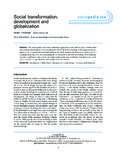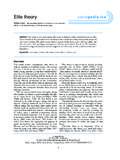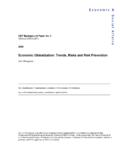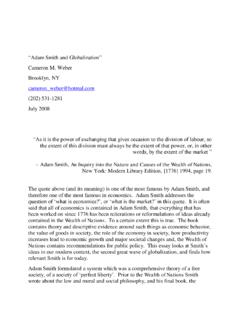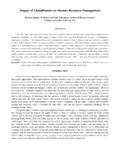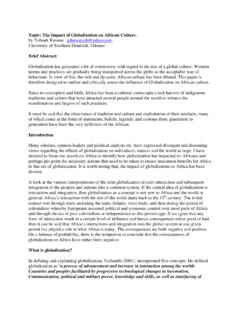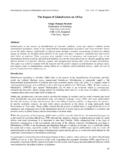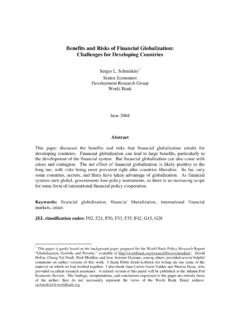Transcription of Cultural globalization: 2001–10 - SAGE Publications
1 Cultural globalization : 2001 10. Diana Crane University of Pennsylvania abstract This article reviews theories concerning the effects of Cultural globalization on national cul- tures, the nature of transnational networks and flows and the emergence of world culture and global civil society. A survey of articles on Cultural globalization listed in two information databases in the past decade is used to locate new and revised theories and to identify frequent topics of study and regions where researchers are concentrated. Topics for future research are suggested.
2 Keywords Cultural flows u Cultural imperialism u global civil society u hybridization u media imperialism Introduction Although it has not attracted as much attention as the ization on national cultures; (2) theories concerning subject of economic globalization and globalization in the transnational networks and flows through which general, the study of Cultural globalization has a set of Cultural globalization takes place; and (3) theories basic concepts, several prominent theories, classic concerning the emergence of world culture and glob- authors (including Appadurai, 1996; Barber, 1995; al civil society.)
3 Articles on Cultural globalization , pub- Bhahba, 1994; Hannerz, 1996; Huntington, 1996, lished during the past decade, are used in this article Nederveen Pieterse, 1995; Robertson, 1992; as an indication of the areas in which current research Tomlinson, 1991, 1999), textbooks ( Hopper, is taking place, the extent to which these three types 2007; Nederveen Pieterse, 2004; Scholte, 2000; Wise, of theories are the subject of research and the emer- 2008) and reviews (including Robertson, 2001; gence of new theoretical models in the field. Due to Tomlinson, 2007).
4 Space considerations, I do not discuss the history of The field incorporates scholars from several disci- globalization in previous centuries or the extent to plines, including anthropology, sociology, communi- which phenomena analogous to Cultural globalization cation, Cultural studies, geography, political science were present in the past. and international relations. Consequently, the litera- ture is scattered among a large number of journals that originate in many countries and several languages. Cultural globalization : definitions This review focuses primarily on the recent literature in sociology.
5 The subject is very broad, because there globalization connotes the increasing interconnected- are many forms and types of culture that are potential- ness and interdependence of social, Cultural and eco- ly global or transnational, ranging from material cul- nomic phenomena across national boundaries. Held tures and the cultures of everyday life to cultures (quoted in Guibernau, 2001: 427) states: It [global- produced by or associated with media organizations, ization] is about the stretching of connections, rela- arts communities, scientific institutions, political tions, and networks between human communities, an institutions, economic organizations and markets and increase in the intensity of these, and a general speed- religious institutions.
6 Ing up of all these phenomena.' Cultural globaliza- Three types of theories have dominated the field: tion, which refers to cross-border flows of national (1) theories concerning the effects of Cultural global- and transnational cultures, has very broad 2011 The Author(s). 2011 ISA (Editorial Arrangement of ). Diana Crane, 2011, Cultural globalization : 2001 10', , DOI: 1. Crane Cultural globalization : 2001 10. connotations that hinder the development of precise the survival of national Cultural industries in smaller, definitions and testable theories. weaker countries whose Cultural goods are often The term, globalization , is usually a misnomer, unable to compete in their own countries with those since Cultural phenomena that transcend national that are distributed by international media conglom- boundaries rarely incorporate all nations in the erates.
7 Transnational corporations (TNCs) can elim- world or even all of its continents because of the inate or decrease opportunities for the expression of enormous diversity of national cultures in terms of indigenous cultures by substituting western media wealth, power and resources for disseminating and culture. receiving Cultural materials and artifacts. Empirical In both types of theories, Cultural globalization is research on Cultural globalization tends to be restrict- criticized on the basis that it is disseminating a ed to an examination of the impact of a specific form homogeneous, hegemonic form of culture, reflecting of transnational or global culture on a single nation- the attitudes and values of western, particularly al culture.
8 American, capitalist societies. Cultural hybridization as a theory argues that cul- tural globalization is accompanied by a desirable out- Frameworks for the study of Cultural come, the hybridization of national cultures, which globalization Nederveen Pieterse (2004: 64) defines as the ways in which forms become separated from existing prac- In this section, I review the major theories of global- tices and recombine with new forms in new prac- ization (see Figure 1). In subsequent sections, I dis- tices'. According to this theory, hybridity may occur cuss empirical findings and modifications of these through global localization' or glocalization', in theories that have been published in the past decade.
9 Which a globally disseminated product is altered in order to fit the Cultural outlook or tastes of people in Effects of Cultural globalization on a specific country or of members of a specific ethnic national cultures group within a country (Iwabuchi, 2002; Nederveen There are two principal theories in this category: (1) Pieterse, 2004: 49 52; Robertson, 1992). Cultural /media imperialism in which one culture People who are exposed to foreign cultures are dominates or is imposed on others and (2) hybridiza- influenced selectively, depending upon the charac- tion in which new versions of culture emerge when teristics of their national or ethnic cultures, and are different cultures come in contact with one another.
10 Likely to integrate foreign elements with their own Cultural imperialism as a theory referred to the cultures, as illustrated by Liebes and Katz's (1993). imposition upon other countries of a particular empirical studies of how audiences in different coun- nation's beliefs, values, knowledge, behavioral norms tries, belonging to different ethnic groups, interpret- and style of life (Salwen, 1991). Beginning in the ed the television serial Dallas. Alternatively, people 1960s, scholars argued that American culture dis- synthesize diverse Cultural influences in their envi- seminated in other countries constituted a form of ronment to produce distinctive hybrid Cultural prac- Cultural imperialism or Cultural domination tices, institutions and meanings.
